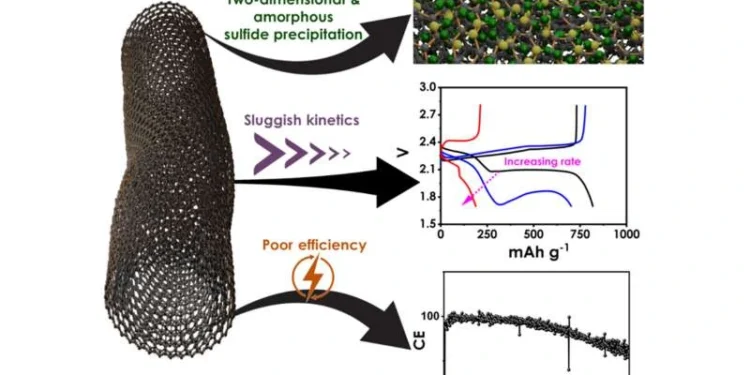As the electric vehicle (EV) market continues to expand, one of the biggest challenges remains battery range and longevity. While modern lithium-ion batteries have improved over time, their limitations still leave many drivers dissatisfied. According to FIU News, now, researchers at Florida International University (FIU) have developed an innovative platinum-enhanced lithium-sulfur battery that could revolutionize EV range and performance. This next-generation battery chemistry, known as “beyond lithium-ion”, offers higher energy density, lower costs, and longer-lasting performance—potentially making EV ownership far more convenient.
The Potential of Lithium-Sulfur Batteries
Why Lithium-Sulfur Over Lithium-Ion?
Lithium-sulfur (Li-S) batteries have long been seen as a promising alternative to lithium-ion batteries due to their:
- Higher energy density – Can store more charge, allowing EVs to travel farther.
- Lower production costs – Sulfur is cheaper and more abundant than materials like cobalt and nickel used in lithium-ion batteries.
- Lighter weight – Improves overall vehicle efficiency and sustainability.
However, the biggest drawback of lithium-sulfur batteries has been their short lifespan. Traditional Li-S batteries degrade quickly, often becoming useless after only 50 charge cycles due to a chemical reaction that causes mossy lithium build-up and energy loss.
Platinum: The Key to Extending Lithium-Sulfur Battery Life
The Chemistry Behind the Breakthrough
The research team at FIU’s Battery Research Lab, led by Associate Professor Bilal El-Zahab, spent eight years studying ways to stabilize lithium-sulfur chemistry. The solution? Adding tiny platinum nanoparticles to the sulfur electrode of the battery. When a lithium-sulfur battery charges, lithium ions move to the sulfur side, forming polysulfides—compounds that often cause efficiency losses and degradation. Over time, these reactions create unwanted deposits on the lithium side, leading to energy inefficiency and rapid battery failure.
To prevent this, the FIU team used platinum nanoparticles as a molecular traffic controller. The platinum guides lithium ions smoothly through the system, preventing harmful chemical reactions that cause battery deterioration. Aqsa Nazir, a postdoctoral researcher at FIU and lead author of the study, highlighted the effectiveness of this method:
“We achieved a 92% retention after 500 charging cycles, which means the battery is nearly as good as new.”
This is a significant leap forward, as it minimizes performance losses and moves lithium-sulfur batteries closer to commercial viability.
Why Platinum Works—And How Much Is Needed
What’s remarkable about this breakthrough is that only a tiny amount of platinum—just 0.02% of the total battery composition—was required to make a difference.
According to El-Zahab:
“Adding nanoparticles of platinum to the battery is like adding a pinch of salt to food: A small amount can have an outsized impact.”
This discovery means that platinum, often associated with high costs, does not have to be used in large quantities, keeping the overall battery price competitive.
What This Means for the Future of EV Batteries
Longer Range and Improved Battery Performance
With lithium-sulfur batteries enhanced by platinum, EVs could:
- Travel significantly farther on a single charge, reducing range anxiety.
- Offer better long-term performance, eliminating concerns about rapid battery degradation.
- Be produced at a lower cost, making EV technology more affordable.
Additionally, this breakthrough extends beyond EVs. Laptops, smartphones, and even space technology could benefit from lighter, longer-lasting batteries.
Commercialization and Next Steps
The FIU research team’s lithium-sulfur battery is currently undergoing third-party testing—a crucial step before licensing and commercialization. If successful, this technology could be integrated into EV production within the next few years, challenging lithium-ion batteries as the dominant energy storage solution.
Conclusion
As third-party testing and commercialization advance, platinum-infused lithium-sulfur batteries are poised to revolutionize energy storage by offering extended EV range, reduced charging frequency, and a more sustainable, cost-effective alternative to traditional lithium-ion batteries. With their potential to enhance consumer electronics and transportation, ongoing innovation in this next-generation battery chemistry could significantly accelerate the global shift toward cleaner and more efficient electric mobility.
Want to stay updated on the battery industry? Check out the latest news on BatteriesDaily!











